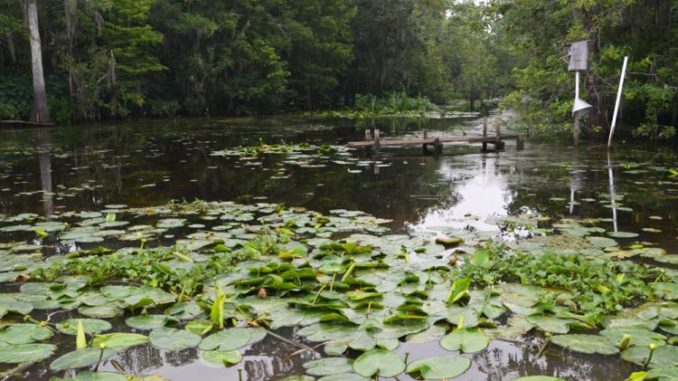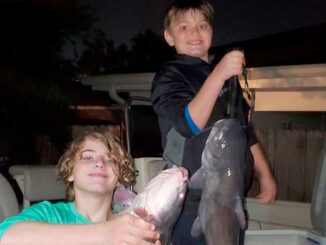
Blind River is one of Southeast Louisiana’s secret spots. Located between the major population centers of urban and suburban New Orleans and Baton Rouge, it may be accessed from U.S. Highway 61, which parallels Interstate Highway 10.
It is easily one of the state’s most scenic cypress-tupelo swamps, and the river itself is an official Scenic River in Louisiana’s Natural and Scenic Rivers System. The swamp along the river is a riot of green — a jungle.
There are enough old growth cypress trees left from the old days to add majesty to the subtropical tapestry of irises, lily pads, elephant ears, cut grass, duck weeds, tupelos and wax myrtles.
“I never get tired of looking at the scenery while I fish,” murmured Johnson reverentially.
There are lots of largemouth bass too, but compared to other places, they are smaller, he explained. “People look at the habitat and come with expectations that are too high. They expect bigger fish.
“There’s a local evening tournament on Wednesdays here. Twenty-five to 40 boats will enter it. Eight or 9 pounds will win it. But the bass are very plentiful here.”
The worst thing about this area are the effects of hurricanes and tropical storms. The water comes up extremely fast with several days of south and east winds, plus rains. Then it takes a long time for the water to go out.
“The water gets bad — it’s hot that time of year already, and the low-oxygen water kills fish,” he rolled his eyes for emphasis. “Massive — it takes a couple of years to recover.
“Another problem is the weir on the entrance of the Diversion Canal from Amite. It’s designed to allow 30 percent of the Amite River’s flood waters to enter Blind River. The rocks in the weir have sunk and now 70 percent comes down to Blind River.
“So much water can come down the Diversion Canal that it can force Blind River to flow backward and fill the swamps. This results in poor water quality and minor fish kills, mainly shad. It also makes the river muddy.”
